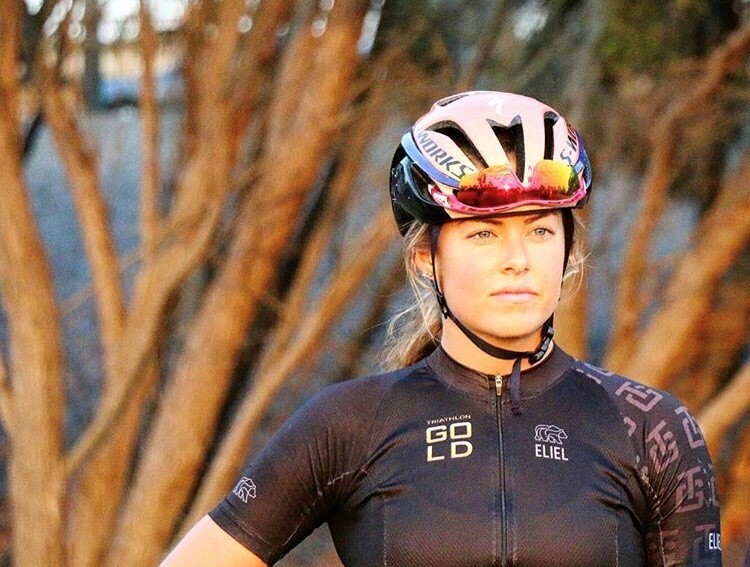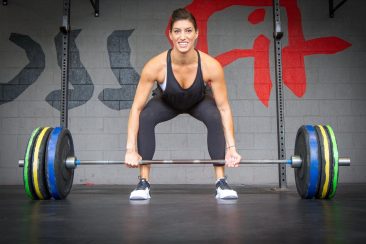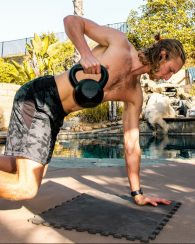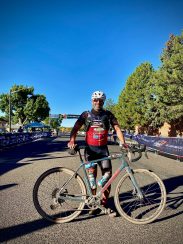Welcome welcome, hopefully everyone is having a lovely week so far. This past week we had Jessica Rocheleau, a phenomenal, inspiring woman who is taking the triathlon world by storm. So just in case you missed her live on instagram, here's her story at hand. Read on to learn more about this remarkable athlete.
“The two most important days in your life are the day you are born and the day you find out why”
- Mark Twain
G: Can you give us a little background on how you got into sports and what got you into your very first sport?
J: Yeah, well like most kids I grew up playing soccer and my first soccer team was actually all guys, which I just realized when you asked me that. But yeah playing soccer throughout elementary school I remember we had the P.E test, the mile, I was the fastest girl with the mile and third for the guys as well which to me I wasn't expecting that, and other maybe weren't either but its something I really grasped on to & I thought it was really cool. I was so curious like what else can I do. It gave me the confidence at a really young age. But yeah through soccer I then started to swim and swimming is how I was got introduced to bikes and running and all that good stuff.
G: Its cool, theres a lot of themes with these interviews of people finding their sport through our parents but is funny how our first guest in and you both had a school event and realized Im kind of good at it.
J: Yeah you don't think you're good at it at that young but its like that feeling that makes you want more. For me, it wasn't necessarily winning but just knowing that I could do something like that.
G: Exactly, I've heard from a lot of athletes who start in their sport, not because they're good at it but because you enjoy it. Even if like running or swimming, kind of gnarly, some people are more suited for that, but the winning comes later.
Around the age of 13, Jessica was thinking about college and if she wanted to specialize in a sport.
J: So yeah it came down to not having enough hours in the day to devote to soccer and swimming and all the other sports. I wanted to do both but I also knew I wanted to do something college, so at that point it was just something I wanted to specialize in. Swimming was the sport I chose but I was also just tired of getting injured from soccer too, I was in a boot in two times while I was playing soccer. It was one of those things that I knew that swimming would be more sustainable for my type of energy in the water.
G: So going back, talking about injury, thats pretty early on for you to deal with injuries so what kind of stuff happened?
J: So I think at a young age, my first injury was when I played soccer. I was on a travel team, playing 3 v 3, which is super short field with three players and its just a lot of running. I think I loved it so much that I didn't register pain receptors very well when I was little and I ended up getting a stress fracture in my foot. I told my parents I was ready to go back and I ended up hurting it again and that's when I decided to chose swimming. But I was never injured from swimming, which is amazing, never a shoulder injury or anything that kept me from pursuing that. I think water sports ended up being my first great passion and love and I was good at it.
G: Thats awesome, what events did you compete in for swimming?
J: I specialized in the 1000 freestyle, that was my best. Then I did the 500 and 400 IM. So if you talk to any swimmer they look to me like thats not the best events to have going into conference because you have to swim each event twice, if you make it back of course, so my events out of racing equaled 3000 for distance which is pretty gnarly when you think about it. But it was what I was good at.
Jessica made the tough decision to chose between soccer and swimming when she headed off to college but for her it was clear cut. From the age of 13 on, she had devoted so much time into swimming that she was recruited onto a college team and receive scholarship too.
Unfortunately though at the age of 17, Jessica had to have back surgery which kept her out of the pool for some time. However, that minor set back just ensured her love and passion or the sport because she was dying to get back out and swim.
G: What did it feel like to go through a major surgery in concerns for your sport?
J: Honestly I can say it was one of the hardest times of my life. It was one of those things where at school I had to stand up in class because it was the kind of pain that pinched the sciatic nerve and so it just inhibited me from doing anything....normal really. So as a junior, thats the time you're getting recruited for college so I had to just go with the times of that year.
G: That sounds super monotonous but you're definitely driven and it shows how strong you are if you can get a scholarship off those times and still send it off to college with that sport.
Jessica attended Nova Southeastern in Fort Lauderdale, Florida.
G: So getting into your college experience as an athlete, talk to us about that a little bit about the growing pains of their program and throughout your years there.
J: Okay so freshman year, is always going to be the most exciting theres a lot to look forward to. You know the team is new, you get to meet everyone and my experience from freshman to sophomore year was amazing, I loved everything about it. Of course the practices were tough, the morning swims and the freezing cold, well you can't get that cold in south Florida but you know what I mean. Then my junior year, things started to go downhill. I actually decided to quit swimming that year. I had this grand vision in my head that I would start pursuing triathlon. Given the circumstances and looking back on it now I didn't want to quit but it was the best decision I could have made. Then my senior year I had no sport...speaking of scholarship, that was tough. But I worked and I got to train whenever I wanted. So yeah thats when I started to do all my triathlon training was in college, by myself.
Some days after Jessica's 2 hour swim practices she would take off for a run. Some called her crazy but she simply just loved running and it was her time to clear her head after practice and before classes.
"It's funny I've always felt like such a workhorse. The training aspect has always been so rewarding".
G: So we talked a bit about how you got into tri and how you overdid it on the running and all that. Talk a bit about that set back.
J: Yeah so I emailed the USA triathlon coach, Barb, back when I was a sophomore, wanting to pursue triathlon as soon as I graduated. So after I quit swimming she suggested that I joined a club or ran cross-country so I spoke to NS XC coach and he was really supportive and he was on board and I got to take his training program over the summer. For my body type it was just too much, as a swimmer, I think if I remember correctly it was about 5 miles a day with 1 rest day. About 6 weeks into it, I had a hip issue which going into my senior year was just totally cut from the plan. I went to physical therapy to learned so much about how to maintain your body as a runner. Then when I did graduate I spoke with Barb again and she suggested I move back to California which was great because my family lives out here and the team I wanted to be on was based in Carlsbad, the US developmental Team. I got to train and ride with them, I had to prove myself to keep up with them but that's how I started with triathlon right out of college.
G: Thats awesome, nice to have your family with you through that.
San Diego is a huge spot for triathlon training, both for men and women. Though for a younger athlete it can be tough spot to land given the price of living is so much higher out here.
G: So after college, how much longer after graduation did you start competing for tri?
J: Well I graduated in 2015, and I spent a solid 3 years going up and down with injury, trying to get to a point where I could sustain the training load without hurting myself again. So I competed in a lot of local races which is awesome because now I work for the company that puts on those races. I started off winning the local races for the women. I did the Malibu Triathlon, that was one of the races I wanted to get my name out there. Yeah right out of the water I was in first, I came off the bike in second and the run was always the most difficult but I think I built up enough confidence that I could compete at the highest level which is what the developmental coach saw in me.
"I really just focused on myself and made a lot of personal gains".
G: Lets talk about road
J: So all last year I was in Australia with the developmental team, and I did a bunch of races out in Australia which were semi-professional. The level of athletes were a bit more experienced, Australia hosts a lot of triathlons but California is also a hot spot for great triathletes too.
Weave some more info about here time in Australia
G: Alright now lets get into XTERRA. Break it down for us.
J: So I always knew about XTERRA but I wasn't super confident in it because of the mountain biking aspect, I've never mountain biked in my life. But towards the end of the season while I was in Australia it kind of clicked in my mind that I do really well with the elements and the gritty unexpected part of racing and I wasn't getting that with ITU. Its very structured and predictable , you know exactly whats going to happen. So I started doing some research and when I got back to the states I contacted some local companies "Hey I'm leaving in a month, cant be super expensive, basically I just need it to work" so Fezzari put in a deal and gave me a bike. So I got into mountain biking about a month before my first XTERRA race ever. So I did the race, it was the absolute, most challenging race, both physically and mentally for me. It rained there for two weeks prior to the race. I rode my bike there maybe a total of 7 miles. Oh gosh, it took me such a long time. People were quitting, crying, no one wanted to finish. But I knew if it finished the race I could qualify for world! So I knew I had to pull it together and finish. I qualified for Worlds in Maui!
G: So rad! Such a cool story. Well talk to us about Worlds.
J: The first race was in May and Worlds was in October so I had solid time to get a grip on the mountain bike due some more technical and downhill work, and build confidence. The race was in Maui, my parents got to go with me which was great. We got there about a week before the ground was dry which was great, ideal terrain for a mountain biking. Then the morning of the race it rains. It was super easy to get all stuck in my head about it but the pros show up with 3 different tires and I showed up with my one mountain bike and just wanted to ride it. The swim was great, Maui is known for there massive waves, but luckily we had good swim so that was great. Then on the bike I ended up getting a flat on my back tire. It was a slow leak, not boom you're out, just ride it through and get some help. Unfortunately I didn't bring a kit to fix it because I thought it would be okay I guess. I ended up having to walk my bike after I flipped over the handlebars, crashed my ribs, skinned my knee, I ripped my suit, the on with my name on it and the USA team. I shed some tears for sure, I got really upset because you spend so much time and preparing for this moment and for me this was my moment to get into Women's XTERRA, I wanted to compete with the big girls and show up and do really well. So that was rough. But I shook it off and I finished the race. It took me 2 & 1/2 hours than it should have but I finished and that's all I really wanted.
G: How long of a day was that total?
J: About 5 & 1/2, maybe longer. To put it into perspective, the women's winner was around 3 hours and I was at a least an hour behind.
G: Yeah for what its worth, you're definitely not the only person going through similar things but the perseverance and mindset that you're going to push through and finish is awesome. That shows how much of a competitor you are. Super inspiring.
J: Yeah it was incredible. These women saw me fly over my bike and get the wind knocked over me and they stopped to help and I thought how this would never happen at a world championship. It just goes to show how special that community is. I think I knew right then and there this was what I wanted to do. XTERRA. Despite all the mishaps I felt it was my calling to do XTERRA.
G: Why don't you tell us a bit about what you do when you're not on the bike or racing XTERRA.
J: About 5 years ago, I was introduced to adventure type racing through an event known as the Tahiti Waterman Tour. Its a series of endurance sport events that revolve around the ocean. Its stand up paddle boarding, sit paddling, swimming, and the coordinator will throw in random ones. At one competition there was a plank challenge, last man standing wins. So everyones in a plank, you're being watched, you have to hold your form and the last person to stand wins. Its things like that, theres so many competitions where you know whats next but in this type you have absolutely no idea what you're doing til moments before. I got really addicted to that type of atmosphere. The motto of the event was "Expect nothing, be prepared for everything". There was one part where we did a 40k paddle around Bora Bora. I had never done paddle boarding before and we were just off. It took me 7 hours. The experiences I've had with these events test everything you can possibly imagine.
"At this point, theres a lot of things I wouldn't say no to. I love it, its type 2 fun"
G: Beyond sports, from home, you work with a couple different brands like Rickaroons which is how we know each other from Taco 'Bout It Tuesday, but talk a little bit about Rise and your coaching experiences.
J: So the feeling I had when I was young, playing that sport for the first time was an experience that I really wanted to give back. Everything that I've done takes a lot selfish training but with that Ive really been able to know myself to give that to somebody too. To give younger girls the same chance, which is that Rise athletes takes into account, the mindset at a young age. Rise is a group of olympians who mentor younger athletes and teach them the mindset, skills, resiliency, and all these things that help them when they grow up to know that they can do anything they put their minds to. So I started working with them officially about a year ago. Before that I was a swim coach here in Coronado for about 4 years and all while doing that I was junior lifeguard here for SD beach. So yeah a lot of things that orient around kids are what I feel really strongly about. Being that person for the next generation to look up to. A positive influence, its just really rewarding to work with the young kids, its so special.
G: I think that's really great. I know a lot of athletes that do that with their off-season. Its incredible you have so much to teach them and offer them, a lot of kids don't get to meet their full potential because they don't have that. They have people pushing them but not a lot who tell them "You can do this".
J: I think raw talent can only get you so far. You can find an athlete who has so much talent but in their heads they don't know how to keep themselves going. Thats what I learned from mindset from my coaches is that positive "You can do it" mentality.
Want to know more about Jessica? Check out her website here. Stay Tuned for more Live on Instagrams with Graham.






